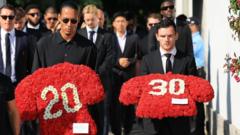
A Premier League in Mourning: The Unthinkable Loss of Diogo Jota
The Premier League community, and indeed the world of football, is reeling from the devastating news emanating from Portugal. The tragic passing of Liverpool star Diogo Jota and his brother, André Silva, has plunged Gondomar into deep mourning. While the BBC's report focuses on the community's grief, the ramifications extend far beyond a single town. This event, undeniably a human tragedy first and foremost, inevitably raises serious questions about Liverpool's immediate future and their Premier League aspirations.
Diogo Jota was more than just a squad player for Liverpool; he was a vital cog in Jurgen Klopp's attacking machine. His versatility, clinical finishing, and unwavering work ethic made him a fan favorite and a tactical asset. Losing him, and in such tragic circumstances, is an immeasurable blow, both emotionally and strategically. His brother, André, though not a public figure, undoubtedly played a crucial role in Diogo's life and career, providing support and stability.
Liverpool's Attacking Dilemma: Replacing the Irreplaceable
Liverpool's attacking depth has been a strength in recent seasons. However, Jota's unique skillset – his ability to play across the front three, his aerial prowess, and his knack for scoring crucial goals – makes him incredibly difficult to replace. While the likes of Darwin Nunez, Luis Diaz, and Cody Gakpo offer different qualities, none replicate Jota's all-around effectiveness. We've seen in the past how significant absences can derail title ambitions. Remember when Virgil van Dijk's injury crippled Liverpool's defense in the 2020/21 season? This loss feels eerily similar, albeit with a far more tragic context.
Furthermore, the psychological impact on the team cannot be understated. Dealing with such profound grief will undoubtedly affect morale and performance. Jurgen Klopp, known for his empathetic leadership, faces perhaps the biggest challenge of his Liverpool tenure: guiding his squad through this period while maintaining their competitive edge. This isn't just about tactics and formations; it's about human connection and providing unwavering support to grieving players and staff.
Historical Parallels: Tragedy and Team Resilience
History offers sobering reminders of how tragedies can impact sporting teams. The Munich air disaster of 1958 decimated Manchester United, yet the club, rebuilt under Sir Matt Busby, eventually rose to become European champions a decade later. Similarly, the Hillsborough disaster in 1989 profoundly affected Liverpool, both on and off the pitch. While such events are fundamentally different in nature to the current tragedy, they highlight the resilience of the human spirit and the ability of teams to overcome adversity, albeit with immense difficulty and pain.
Predictions and Potential Implications
In the short term, expect Liverpool's form to be inconsistent. The emotional toll will be significant, and it will take time for the team to adjust to playing without Jota. The January transfer window presents an opportunity, but finding a player of Jota's quality mid-season is a tall order. Liverpool may need to rely more heavily on their youth academy or explore loan options to bolster their attacking options. Longer term, the club's hierarchy will need to carefully consider how to honor Jota's memory and ensure his legacy lives on.
This tragedy forces us to reflect on the fragility of life and the importance of perspective. Football, with all its passion and drama, is ultimately just a game. While Liverpool's Premier League hopes may be diminished, the outpouring of support from across the footballing world demonstrates the power of unity and compassion in the face of unimaginable loss. The question now is, can Liverpool find the strength to honor Jota's memory by rallying together and achieving something truly special this season, or will this tragedy prove too great a burden to bear?